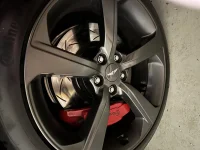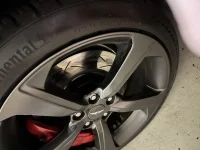Ok I think I need some help here. These pads and rotors are brand new. The only thing is that these pads rode on really badly hotspotted rotors for a week. This is from one hard braking where they got hot, and I didnt stop after that I let them cool down before I stopped. I have already followed the proper bedding procedure and they bedded in very well. Are these just deposits or do I need to be worried about something like hub runout? (DBA 4000 T3 and EBC Blue stuff pads) That being said if im just being to hard on them pls tell me. There is also no vibration in the pedal or steering wheel.
That looks like the pad weren't seated properly with the rotor. A few possibilities:
1. There might have been a good amount of pad material deposits left on the rotors. The new pads picked it up and subsequently glazed over parts of the pad wearing surfaces.
2. The pads/rotors were not de-greased thoroughly enough. This is especially true for brand new rotors, which is typically pickled in preservation oil to prevent rust. It is of paramount importance to make sure the pads and rotors are cleaned and degreased before installation. And even after installation, I'd spray it down with brake cleaner just to make sure any finger smudges are removed. Needless to say, I use a lot of brake cleaner spray.
If any dirt/oil/grease/ silicone are left on the wearing surfaces, they can glaze over and cause friction problems.
3. The rotors were previously used with another set of pads and were not re-surfaced before installing new set of pads. Over time, the pads/rotor will wear into each other and not always in a nice perfectly flat and square manner. There could be grooves, bevels and/or concavities. This is why it's important to resurface old rotors before installing new pads... unless you have measured the rotor with a precision caliper or micrometer and are satisfied that it is flat/square enough to take a chance. Even then, I would go very very easy at first, not apply brakes hard, and check pad/rotor wear pattern after each drive.
4. Under no circumstances should you attempt to
bed the pads/rotors, until you have inspected them and know with absolute certainty they are ALL
seated properly. Even if I resurface the rotor (or they are completely brand new rotors), I would still go through the seating procedure of going very easy for the first 50-100miles or so, and checking pad/rotor wear pattern after each drive. This becomes exceedingly critical if you don't turn old rotors.
5, Unlike other more-street-oriented EBC pad compounds, Bluestuff does not have an initial break-in seating layer. This makes the above even more critical to get done right. Bluestuff is meant as a purposely built track pad, so the assumption is that the owner is well versed in how to seat/bed new pad/rotors properly. This is not a beginner-friendly pad compound.
If your pad/rotor mating surfaces are not 100% flat and square against each other, then only certain parts are making contact. Then when you slam on the brakes hard, all that braking pressure is applied to only a small area of the pad/rotor interface. The end result is overheating/glazing/hot-spotting.
The only thing that I can think of is that I didn't grease the back of the pads and probably didn't clean the calipers off enough.
I don't ever put grease anywhere near my brakes. These things could get very hot and any grease you put on will quickly melt into hot liquid and run everywhere... quite likely places that you do not want grease to run into.
Brakes pads do NOT need any lubrication. All I do is clean everything thoroughly. The only place I might possibly use grease is the pad carrier pins. Even then, I would clean them to shiny bright metal, then smear only a tiny amount of grease over each pin, rub it with my fingers all over the pin, then wipe all the grease off it. All that is left is a microscopic coating of oil, not enough to attract dirt/grime, but just enough lubricity for the pads to slide on them easily. Everywhere else around the brakes should be absolutely clean and dry.











